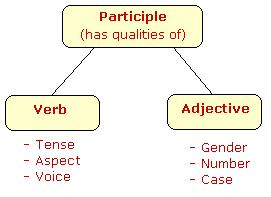A Participle is a verbal — a verb form that looks like a verb but does not act as the verb in a sentence. A participle usually acts as an adjective to modify a noun or pronoun.



- working man (adjective)
- broken heart (verb)
- asking me (adverb)
What is a Participle?
A Participle is a form of a verb that can function as part of a verb or adverb phase, or independently as an adjective or an adverb. A participle ends in -ed or -ing (except for some irregular verbs). A participle is formed from a verb and modifies a noun, noun phrase, pronoun, verb, or verb phrase. Most often, a participle functions as an adjective.
Consider the following examples:
- to run – running – I saw a running man.
In this example of a participle, the verb ‘to run’ is used. ‘Running‘ becomes the participle as it is used as an adjective to describe ‘man.’ What kind of man is he? A running man.
- ride – riding – I saw a boy riding a bicycle.
In this example the whole phrase ‘riding a bicycle‘ acts like an adjective. It describes the noun ‘boy’. The word ‘riding’ acts also like a verb, because it has ‘bicycle’ as its object. The phrase ‘riding a bicycle‘ is an action-based description of the boy.
Types of Participles
There are two types of participles in English: past and present.
Present Participle
Present Participles are forms of verbs that express a non-completed or continuing action. They end in ‘-ing‘ and are used with auxiliary verbs ‘be’ and ‘have’ to make continuous tenses, such as Present Continuous, Present Perfect Continuous, etc.
- It is raining all day long. (‘be’ + raining)
- The choir was singing beautiful chants. (‘be’ + singing)
- Cindy and Shaun have been spending their vacation at the sea.(‘have’ + spending)
How to form Present Participle
To form the Present Participle we add ‘-ing’ to the base form of the verb:
- to play → playing
- to hide → hiding
- to swim → swimming
| Note: Spelling rules for verbs when adding ‘-ing’. 1. For verbs with silent ‘-e’ at the end, change ‘-e’ to ‘-ing’: – to choose → choosing – to glide → gliding 2. For verbs with ‘-ie’ at the end, change ‘-ie’ to ‘-ying’: – to tie → tying – to lie → lying 3. For verbs with ‘consonant + vowel + consonant’ at the end and final syllable stressed, double the last consonant (except for ‘-x’ and ‘-w’) and add ‘-ing’: – to for’get → forgetting – to ‘swim → swimming |
Present Participle vs Gerund
When -ing forms are used as verbs, adjectives or adverbs, they are called Present Participles. They can refer to present, past or future.
When -ing forms are used like nouns, they are called gerunds.
Compare:
- He was swimming when I came. (Here, ‘swimming’ means an action and acts like a verb)
- Swimming is my favorite sport. (Here, ‘swimming’ acts like a noun)
Past Participle
Past Participles are forms of verbs that express a completed action. They end in ‘-ed‘
except for irregular verbs) and are used with auxiliary verb ‘have’ to form perfect tenses such as Present Perfect, Past Perfect, etc., and Passive voice.
- I have passed the exam and I am very happy. (‘have’ + passed)
- Jane had planned to take the kids to the beach, but the weather changed. (‘have’ + planned)
- We have finished our work for today. (‘have’ + finished)
How to form Past Participle
In most cases (for regular verbs), to form the Past Participle we add ‘-ed’ to the base form of the verb:
- to listen → listened
- to like → liked
- to drop → dropped
| Note: Spelling rules for verbs when adding ‘-ed’. a) For regular verbs ending in ‘-e’, add ‘-d’: – To live → John lived in Brazil. – To close → She closed the door. b) For regular verbs ending in one consonant + ‘-y’, change the ‘-y’ to “-ied”: – To study → They studied German. – To try → I tried to be kind. c) For regular verbs that end in one vowel + one consonant, double the consonant and add ‘-ed’: – To stop → They stopped the car. – To plan → Nick planned a business trip. d) We do not double the consonants ‘y’ or ‘w’: – To play → She played piano. – To row → He rowed 3km yesterday. e) We do not double the consonant when the last syllable is not stressed: – To listen → I listened to the radio. – To visit → Margaret visited her mother on Tuesday. |
Some common verbs in English have irregular Past Participle forms:
- I don’t feel (base form) quite well today. – I haven’t felt (past participle form) very well for over a week now.
- Helen has gone to Madrid. She will be back next Sunday.
- Mary has done her homework perfectly, her mam’s glad.
- The police have found the suspect within three hours.
When to use Participles
Present Participle
Present participles are used as adjectives and to create Continuous (Present, Past, and Future) verb tenses.
- Adjectives
- barking dog
- flowering tree
- Verb Tenses
- I am thinking. (present continuous)
- I was driving. (past continuous)
Past Participle
Past participles are used as adjectives and to create Perfect verb tenses (Present, Past, and Future) and the Passive voice.
- Adjectives
- spotted dog
- broken vase
- Verb Tenses & Voice
- I had left. (past perfect)
- I have visited. (present perfect)
- The lesson was finished. (passive voice)
Here’s a good video from EngVid explaining how to use participles in a sentence:
See also: